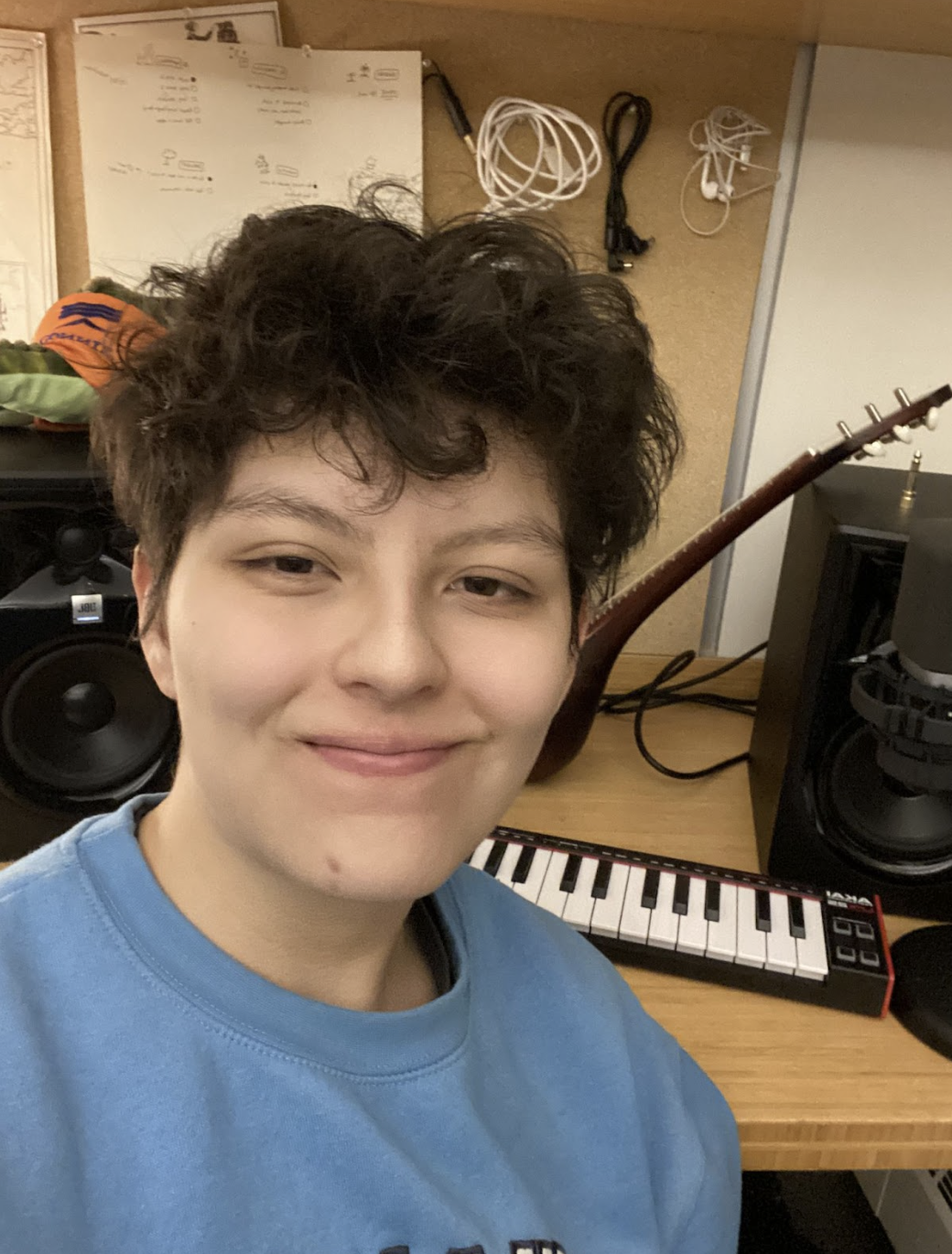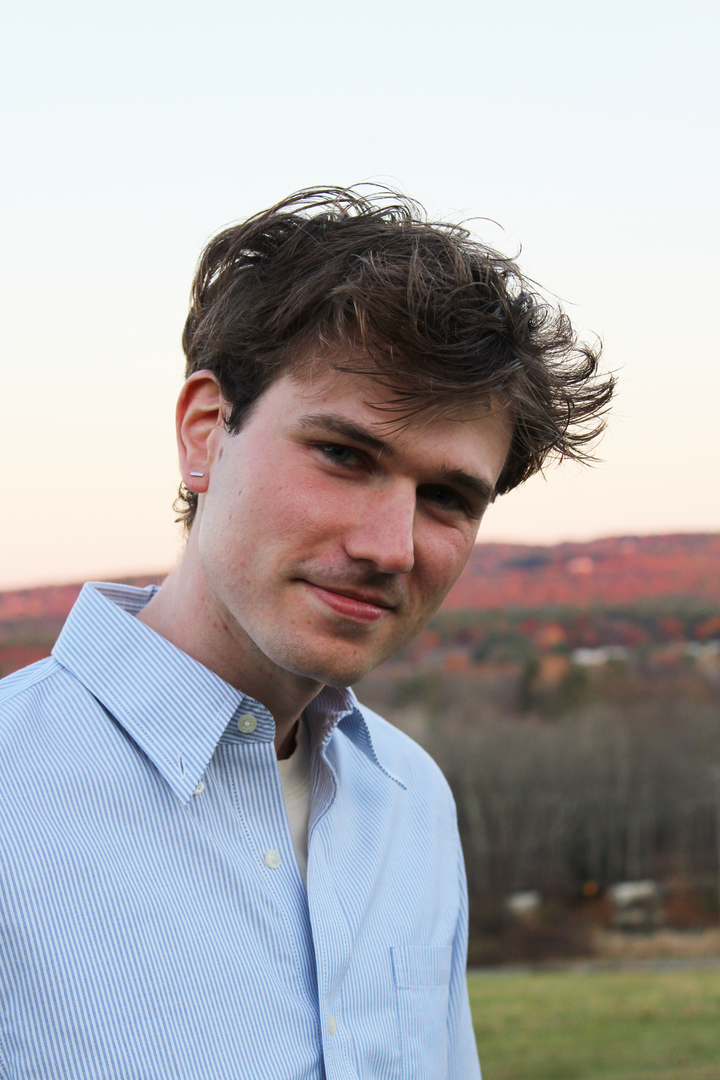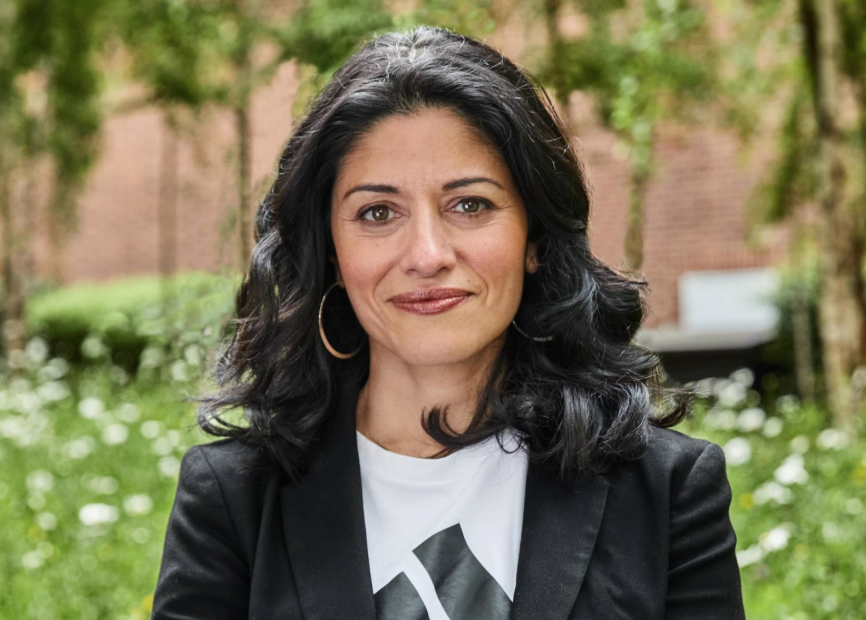Thoughts on Theses: Alma Clark
Alma Clark ’25 is a senior double majoring in computer science and music. Clark’s thesis is a full-length studio concept album, infusing modern electronic and indie pop to transport listeners 100 years into the future.

Q: Could you tell me a bit about yourself and your journey here at Amherst?
A: Sure! So I’m a senior. I am a double major in computer science and music. I didn’t have any kind of crazy major changes or revelations in my college journey. It’s been a pretty straight shot. I think I knew at least since freshman year that I was going to be a comp sci and music major, with maybe a third major [in] art, but that was a stretch goal. I’m a musician. I think [for] anyone who knows me that would be one of their first words to describe me. I do almost too much music I would say, even though it’s my favorite thing in the world. And because it’s my favorite thing in the world, I’m in two to four bands at any time. I do my own personal music as part of this thesis and outside of it, and I collaborate all the time with other creatives and animators and artists and filmmakers and stuff like that to make music for their stuff. So I’m all about sounds.
Q: What exactly are you working on for your thesis?
A: My music thesis is a full-length studio album. I’ve been working on it for almost a year now, actually, arguably a year. It’s sort of the culmination of everything that I think I’ve learned in the past five years about songwriting, instrumentalism, music production, and storytelling through music. It’s a concept album, and it’s a very narrative album. It’s set 100 years in the future in a sort of optimistic science-fiction future. And every song in it is telling the story of a different character in that world. It’s very influenced by me being a big fan of video game soundtracks and how every track has its own very specific place or character that it’s accompanying. [My album] sort of has that ethos, but with the highly detailed production style of modern electronic and indie pop, and the songwriting narrative inspiration of whoever’s inspired me. It’s really getting into crunch time now of laying down the tracks and actually recording things. But at this point, I know what every song is about. I have lyrics or melodies for almost all the songs.
Q: How did you decide to go with this concept of sci-fi, with an influence from video games?
A: Well, I decided pretty early that I wanted to do a concept album. There were a few ideas bouncing around for this thesis. At first, the idea was maybe it could be a literal video game soundtrack. Then I was like, I would feel bad not also making the video game to accompany that because I’m a game developer, and that would just end up being the majority of the project, I think. So instead I was like, “Well, what do I like about that?” I like exploring a world through very different perspectives in every track. And I knew I wanted to do something a little bit fictional, but I also didn’t want to necessarily go the mystical or fantasy route where it’s totally fictional. I decided sci-fi is a really cool speculative world to exist in that is very deeply fictional. But also everything I’m writing about could exist. It’s a very grounded-in-possibility speculative Earth 100 years from now. So that lets me feel more grounded and have a base point to do real research on climate geoengineering tactics and stuff like that that are actually being discussed now and could actually be put in place in the next 50 or 100 years instead of just making up centaurs and dragons. Even though I do love that type of stuff.
Q: It seems that you really have a creative backing, and the project sounds incredible. Just from hearing how much you engage in the music culture on campus, I imagine you’re incredibly busy this final semester. Are there any challenges or setbacks that you’ve been seeing come up as you get down to the wire?
A: Yeah. I have two bands that are recording bands and are currently putting out singles and even putting out EPs, and I’m one of the main touch points for being the actual person who’s helping to record and produce those. And so that does take up a lot of my bandwidth. It’s always a balancing act of live music and recording music for other bands and recording music for my own project and writing things. It’s been an exercise this year in how far can I stretch myself before I burn out? And at this point, I kind of am not giving myself the option to burn out. So you can check back in May and see what kind of mess I am then.
Q: Well, what’s the most helpful thing that you’ve done to keep you afloat throughout the entire process? Or, are there any tips or tricks or people that you’ve gotten stability from through the process?
A: Staying in community. There [are] three other music thesis students who are writing albums, and we have a sort of support group or just showing my music to friends or showing my music to my advisor. I think that’s big in keeping motivated is showing and proving to yourself that you are making progress and that it’s something worth sharing. I think also just having specific periods of time, although those are probably all in the past now, where I just can’t work on [the] thesis. So this December break, I just didn’t allow myself to do any work on [my] thesis. And so having those mandatory break periods I think is very important. But at a certain point, I think this whole exercise [in] doing a creative thesis is realizing that sometimes you have to force creativity, which is a challenge, but sometimes you’re just like, “Well, I just have to write the rest of these lyrics tonight because there’s a deadline, so I have to just buckle up.”
Q: That must be difficult because it’s not a math thesis or a STEM thesis, where you can almost force yourself to do work without feeling like you’re draining yourself creatively. But creativity is a finite thing, so it must be very difficult to go through that process.
A: I mean, I chose this largely because I love having big-scope projects that have a lot of different tasks involved in very different areas of work. All the songs are in different places right now. So my to-do list isn’t just making songs, it’s much more concrete and specific and varied. Right now, if I wanted to make progress on my thesis, I could open up my composition software and start writing a trumpet solo. Or I could open up my production software and start doing my new synth sound design changes. Or I could open my notebook and start writing lyrics. And so there’s always very different tasks to do. So last night I was working on my thesis, I was just bouncing around from all these different tasks because that way, if I’m ever getting tired or kind of out of creative energy in one department, I’m like, “Well, now I can switch it over to something completely different.”
Q: I’m sure that you’re looking ahead at the future. Do you intend for this thesis to help guide you to any specific career path?
A: I’ve never approached music as a career necessarily, although of course, I would love to be able to do something semi-professionally in music. If my music can sustain itself economically in terms of the costs of recording and stuff, I think I’m happy. I’m in computer science and music and also specifically [concentrating on] game design and development. There’s an intersection there, and I’m very much interested in the technical audio implementation and sound design and composition worlds of games and interactive media. So I think in general, building my skills, especially in digital music production, is the most helpful career skill I’m getting from this. But I also think that I really want to be entering the adult world with this personal project that I can say, “Yeah, I spent over a year on this album and I made it completely.” Well, obviously nothing is done alone, but I’ve done almost every step of this largely by myself. And with more emotional support and feedback from other people rather than direct intervention. So, who knows? I guess you could call this a good portfolio item, but for me, I think it’s more of just a personal accomplishment kind of thing.
Q: And it’s important to have those. And as somebody with such a unique thesis, I imagine it can be stressful to essentially do something that’s never been done before on campus. What advice do you give to incoming students who hope to be as creative as you?
A: In a very specific lens, I would say get in room 217 if you want to make music in Arms [Music Center], which is a relatively new digital music studio. And if you can get in there, especially when you’re younger or you’re an underclassman, you can learn how to use it. I think that’s an incredibly helpful resource. But in a more broad sense, I think definitely explore every resource you can get here because there’s a lot of really nice equipment that you don’t understand how much it would cost if you have to get it by yourself. Try to figure out ways to make your passion projects and the things you’re interested in mesh with your academic work, if that’s what you want to do. If you want to declare it as your thesis project or an independent study or something. But also I would add that I think some of the most creative endeavors and collaborative projects and experiences I’ve had in college were completely extracurricular. And I think it’s very important to make time for yourself outside of classes and clubs and formalit[ies] because there’s no student organization that led me to join bands with my friends, or perform at open mics, or do all these off-the-cuff creative projects. I think the biggest things are to take advantage of the resources you have here and also take advantage of the fact that this is a really important place where you can form collaborative, creative networks and just meet other people who you can work with, even if you’re not in a class with them.
Q: What’s the importance of creating and being creative for you?
A: I think art for me is all about creating delightful things out of the world by picking out things that you find delightful and combining them, creating something as unique as possible. And for [the thesis], I’m trying to create sounds that people have never heard before or song topics they’ve never heard before, and just open up people’s minds both to literal sounds or ideas or creative ethos that they’ve never really considered before. That’s what my favorite part about music is when it does something completely unexpected.
Q: Well, finally, to look towards the future. What interesting musical adventures do you have coming up?
A: I think the next couple months of my life are gonna be a little crazy because I’m gonna have to finish this thing — and that’s also gonna be incredibly exciting. I have new music coming out with both of my bands — The Anti Citizens and The Pipits — very soon, in the next couple of weeks on streaming services. And as I wrap up the semester here, I’ll be both obviously finishing up my own album and trying to record as much music with my bands as possible and get that out there. I’ll just be around. I’ll be playing as much live music as I can fit into my schedule. I’ll be getting as much music as I can fit into this semester. And then we’ll see. Rest assured, after I graduate, I will keep making music.





Comments ()